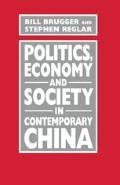Abstract
The Introduction to this book put forward several questions concerning agriculture. Two of those were explicitly economic. What is the best method of extracting a rural surplus for industrial development and is collective agriculture necessarily wasteful? We saw in Chapter 1 that the approach to the first question adopted by the Chinese government in the three decades after 1949 was to manipulate urban—rural trade by buying agricultural goods cheaply and selling industrial goods to the peasants at a high price. Politics during those years centred on the degree of permissible extraction and the method to achieve it (through price planning or through extraction at the point of production by new forms of rural organisation). This chapter hopes to deepen that analysis by looking at the social consequences of various policy shifts. Chapter 2 noted also that the successes of collectivised agriculture, recorded in the 1970s, proved to be illusory once the cost of inputs in relation to outputs was examined more fully. That observation, however, should not necessarily be taken as an indictment of all collective agriculture.
Preview
Unable to display preview. Download preview PDF.
Copyright information
© 1994 Bill Brugger and Stephen Reglar
About this chapter
Cite this chapter
Brugger, B., Reglar, S. (1994). State and Countryside. In: Politics, Economy and Society in Contemporary China. Palgrave, London. https://doi.org/10.1007/978-1-349-23329-8_4
Download citation
DOI: https://doi.org/10.1007/978-1-349-23329-8_4
Publisher Name: Palgrave, London
Print ISBN: 978-0-333-60194-5
Online ISBN: 978-1-349-23329-8
eBook Packages: Palgrave History CollectionHistory (R0)

